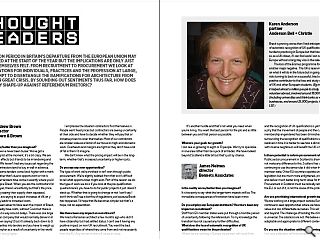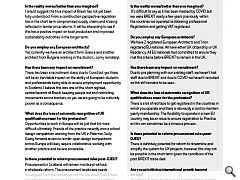Brexit: Thought Leaders
20 Apr 2021
A transition period in Britain’s departure from the European Union may have passed at the start of the year but the implications are only just making themselves felt. From recruitment to procurement we look at the implications for individuals, practices and the profession at large, in an attempt to disentangle the ramifications for architecture from that other great crisis, by sounding out sentiments thus far. How does the reality shape-up against referendum rhetoric?
Andrew Brown, director , Brown & Brown
Is the reality worse/better than you imagined?
In business terms, we’ve never been busier. We’ve got a nine-month waiting list at the moment, it’s a bit crazy. We are seeing some Brexit effects but it tends to be in tendering and contractor pricing. We haven’t had any issues yet regarding the supply chain but contractors tend to buy in well in advance. We are seeing some tenders come back higher with a mark up applied but whether that’s due to opportunism or not is difficult to say. Other tenders have come in exactly where you’d expect them to be pre-Brexit. When you ask the contractors for feedback they say, yes, there’s uncertainty but that’s the price. We are certainly seeing their supply chain squeezed, builders merchants are saying to expect increases of x% on y goods - uncertainty leads to increased costs. It would have been easier to have seen the impact of Brexit, which will undoubtedly have costs, without Covid but there is no choice but to find a way around delays. There was one large Scandinavian timber company that would normally deliver in 8 weeks who were then saying 12 but it’s already back down to 9. It’s bringing complexities into tenders and you have to weigh up whether costs are higher as a result of uncertainty in the world or its just the tender being higher. I emphasise the situation contractors find themselves in. People want fixed prices but contractors are seeing uncertainty at their side and have to decide whether they will pay that or increase prices to cover themselves. Most of our contractors are smaller scale as a factor of our focus on high-end domestic work. Overheads and margins are tight as they don’t have a lot of fat in them I’d imagine. We don’t know what the pricing impact will be in the long-term, whether that’s increased uncertainty or higher costs.
Do you see any new opportunities?
The type of work we’re involved in isn’t won through public procurement. We’re slightly isolated from that so it’s difficult to tell what opportunities might exist. Part of the reason we do the type of work we do is if you look at the pre-qualification questionnaire’s you have to do for public projects it just doesn’t stack up. Whether that is going to change or not I can’t say. I don’t think we’ll see a bonfire of regulations just because Brexit has happened. I’d hope that life becomes simpler but that’s a hope, not an expectation.
Has there been any impact on recruitment?
We hired a Romanian architect a few months ago who didn’t have citizenship but had settled status. I can’t see it having any positive impact on non-UK recruitment. You want the best people regardless of where they come from and not necessarily from the EU. Any barrier to that will cause an issue. It’s another hurdle and that’s not what you need when you’re hiring. You want the best person for the job and as little between you and that person as possible.
What are your goals for growth? I can see us growing to eight or 10 people. We try to specialise in one area rather than be a jack of all trades. We have looked beyond Scotland a little bit but that’s just by chance.
James Nelmes , director , Bennets Associates
Is the reality worse/better than you imagined?
It is too early to say what the longer-term impacts will be. The immediate consequences of transition have been minor.
Do you employ any European architects? Has there been any impact on recruitment?
Staff from EU member states were put through a horrible period of uncertainty following the referendum. To my knowledge the transition has not caused any further difficulties.
What does the loss of automatic recognition of UK qualifications mean for the profession?
Where we are working in Europe we partner with local firms and the recognition of UK qualifications is yet to be an issue. It is a pity that the movement of people and the cultural exchange membership engendered has been diminished. Whilst issues surrounding the recognition of qualifications will likely be resolved in time it is harder to see how a diminution in dialogue with diverse neighbours will benefit the UK in the future.
Is there potential to reform procurement rules post-OJEU? Public sector procurement in Scotland is shameful. Brexit will not make any difference to this. Scotland has committed to continuing to use the same rules it did when the UK was a member state. Other EU countries operate under the same legislation but are much more enlightened, proportionate and deliver much better long-term value for the public purse. Procurement in Scotland must be radically reformed: being in the EU, or out of it, is not the cause of the problem.
Are you prioritising international growth beyond Europe? We are working on a large project outside Europe and will continue to seek opportunities where we have demonstrable value and can differentiate ourselves. This will be in both Europe and beyond. The challenge of tackling the climate emergency is universal. The solutions are not. We believe our skills are adaptable and appropriate to different contexts.
Do you see the situation settling/improving with time? I am sure politicians will find something else to make a hash of.
Karen Anderson , partner, Anderson Bell + Christie
Brexit is proving worse than I had anticipated. The loss of automatic recognition of UK qualifications is clearly a hurdle to practicing in Europe but that loss is augmented, as, as a UK citizen, if I can find work I can no longer live in Europe without a long stay visa in the relevant country. The loss of the Eramus programme for students is another major negative. The UK is reserving its position on what it will do in the future but in going it alone it risks turning its back on a sucessful, tried and tested positive contributor to the lives and study experience of UK and other European students. (Eg in 2019 alone it helped almost a million people to study, train or volunteer abroad, involved around 111,000 organisations (including universities and think-tanks as well as private businesses, and around 25,000 projects. Anne Corbett LSE )
Paul Stallan , design director , Stallan-Brand
Is the reality worse/better than you imagined?
I would suggest the true impact of Brexit has not yet been fully understood. From a construction perspective regulation has in the short term compromised supply chains and is being reflected in tender price returns. It will be interesting to see if this has a positive impact on local production and improved sustainability outcomes in the longer term.
Do you employ any European architects? Yes currently we have an architect form Greece and another architect from Bulgaria working in the studio (... sorry remotely). Has there been any impact on recruitment? There has been a recruitment stasis due to Covid but yes there will be an inevitable impact on the ability of European students and professionals being able to access employment opportunity in Scotland. I believe this was one of the, short sighted, central tenants of Brexit, keeping people out and restricting movements across borders, so yes we are going to be culturally poorer as a consequence.
What does the loss of automatic recognition of UK qualifications mean for the profession? Opportunities to work in Europe will be just that bit more difficult ultimately. Friends of the practice recently won a school design competition working from the UK in Palermo, Sicily. Going forward access to similar open design competitions across Europe will likely require collaborative working with another practice and be less accessible.
Is there potential to reform procurement rules post-OJEU? Procurement in Scotland will remain moribund without a wholesale reform. The procurement landscape needs redesigned from the bottom up not the top down. Brexit does presents an opportunity but not until Government prioritises a ‘sustainable circular economy model’ over a ‘corporate linear model’ will things change.
Are you prioritising international growth beyond Europe? No we are not prioritising growth beyond Europe. Generally our practice model is not predicated on growth, but rather value and differentiation. We do review prospects internationally and are interested in the opportunity. Do you see the situation settling/improving with time? Yes, despite Covid and Brexit we remain busy on projects across the UK and Scotland.
Steve McGhee , principal, LMA
Isthe reality worse/better than you imagined? It’s difficult to say as it has been masked by COVID but we were BREXIT ready a few years previously within the countries we operated ie obtaining professional Registration and getting VAT registered.
Do you employ any European architects? We have 2 registered European Architects and 1 non registered EU national. All have either UK citizenship or UK Residency. All EU nationals had committed to ensure they met the criteria before BREXIT to remain in the UK. Has there been any impact on recruitment? Due to pre planning with our existing staff, we haven’t lost staff due to BREXIT and due to COVID we haven’t recruited so this still remains to be seen.
What does the loss of automatic recognition of UK qualifications mean for the profession? There is a lot of red tape to get registered in the countries in which you operate and there is obviously a cost to maintain yearly membership. The flexibility to operate in a new EU country may be an issue to ensure registration to Practice as this can sometimes be a timeous process.
Is there potential to reform procurement rules post-OJEU? There is definitely potential for reform to streamline and simplify the system for UK projects, however, this may not be possible in the short term given the conditions of the post BREXIT trade deal.
Are you prioritising international growth beyond Europe? We still see Europe as our second biggest market outside the UK and have no plans for growth into international markets.
Do you see the situation settling/improving with time? We wont know the full impact until we settle into the post COVID trading arrangements and the restrictions on people movements are relaxed. I feel that given we are a service industry and are not exporting goods, as long as we forward plan professional and VAT registration to ensure we can trade in each individual EU country we are operating in then everything should be pretty smooth.




